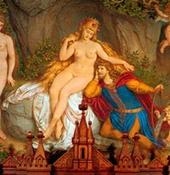Music:
Member Since: 4/12/2007
Band Members:
Cast:
Characters
Tannhäuser, a minnesinger (Tenor)
Elisabeth, the Landgrave's niece (Soprano)
Venus (Soprano)
Wolfram, a minnesinger (Baritone)
Herrmann, Landgrave of Thuringia (Bass)
Walther von der Vogelweide, a minnesinger (Tenor)
Biterolf, a minnesinger (Bass)
Heinrich der Schreiber, a minnesinger (Tenor)
Reinmar von Zweter, a minnesinger (Bass)
A Young Shepherd (Soprano)
Four Noble Pages (Soprano, Alto)
Nobles, knights, ladies, pilgrims, sirens, naiads, nymphs, bacchants
In the Paris version also: the Three Graces, youths, cupids, satyrs, and fauns
Stage Productions: Act 1 Sc 1: "Venusberg-Bacchanal"
Production: Munich 1995. Stage director: David Alden; Conductor: Zubin Mehta.
Act 1 Bacchanalia
Add to My Profile
Act 1 Sc 2 "Beloved, speak"
Production: Munich 1995). Waltraud Meier (Venus), René Kollo (Tannhäuser). Conductor: Zubin Mehta
Act 1 Sc 2 Beloved speak
Add to My Profile
Act 2 Sc 4 Entry of the guests
Production: Munich 1995. Stage director: David Alden; Conductor: Zubin Mehta.
Act 2 Sc 4 Entry of the guests
Add to My Profile
Act 3, Finale
Waltraud Meier (Venus), René Kollo (Tannhäuser), Bernd Weikl (Wolfram)
Act 3 Finale
Add to My Profile
Type of Label: Major
